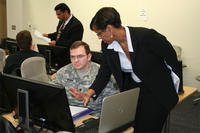Finding a job in a new community can be stressful for anyone facing the challenge of living in a new place. But finding it can be especially challenging for military spouses who must move often as a normal part of military life.
Challenges you may face
As a military spouse, you may face some challenges unique to military life as you look for employment. These can include:
- Your spouse's unpredictable work hours. The unpredictable schedules commonly required of service members can make it difficult for military spouses to rely on their partners for child care or other household needs.
- Frequent relocation. Frequent relocation can be disruptive to a career. There is no guarantee that a job in a certain industry or one that uses certain skills will be available in the new community. Some jobs, such as carpentry or housecleaning, depend on building clientele and it can take time to rebuild your clients after a move.
- Your spouse's absences. It can be difficult to find and keep a job outside the home when you are the one taking care of the children and managing the details of home life. Your spouse's schedule can include long absences for military duty. Not only are these frequent separations draining emotionally, they can make it hard for you to keep a full-time work schedule.
- Geographic location. Depending on where you relocate, job opportunities can be scarce.
- Transportation options. This can be particularly challenging in rural areas where there is no public transportation, as many military families share a single car.
- Employer bias. Employers, particularly in civilian communities, are sometimes hesitant to hire a person associated with the military for fear that person will only be working for a short period of time.
Looking for employment
There are steps you can take before and after the move to prepare for your search:
- Before you move, update your resume and print plenty of copies. You won't want to spend time updating it while you're unpacking and settling in to your new home.
- Hand carry your resumes to your new duty station instead of packing them. You don't want to lose them.
- Think about whether you're interested in working on or off base. There may be good opportunities in both places but you'll need to consider logistics like whether you have transportation available to get you to off-base employment.
On base
Once you've arrived and have settled in to your new community, there are a number of ways to look for job opportunities:
- Contact your the employment assistance program on base. Although each service runs these offices a little differently, all are dedicated to helping spouses with finding a job. Your family resource center will have more information.
- Pay attention to deadlines and requirements for any listings you find. If you miss any required paperwork, applications, or deadlines you won't be considered for the position.
- Attend a spouse's club. It can be a great opportunity to meet new people and to network. Let them know you are looking for a job. They may be able to tell you, for example, which families have recently received PCS orders to move and put you in touch with them before they move. This can be a good way to learn of job openings before they become available.
- Go to a job fair on base. These can be great sources of information. Be sure to bring plenty of resumes.
- Make an appointment to talk with the family service center. They usually hold free workshops on things like how to find a job and resume writing and may have information on local job opportunities.
- Find out if there are any job support networks. If there aren't any, start your own by networking and talking to people in areas you'd like to work.
Off base
If you're looking for employment off base, here are some things you can do:
- Look online for local job listings, or ask your family resource center for help.
- Find out if there are any training or educational opportunities available to you. For example, are there any local colleges or technical schools that offer training for military spouses?
- Learn as much as you can about your new community. Explore the neighborhoods, looking for places you might like to work. Talk to local shop owners and ask whether they know of any available positions.
- Consider volunteering. If you can afford it, this can be a good way to gain valuable skills that can lead to paid positions.
- Sign up with a temp agency. A temp agency can be a great way to network in the community and a good reason to get out of the house before you've made new friends. Having a temp job before you find your "real job" can also give you a sense of normalcy and routine. And temp jobs can lead to permanent positions.
- Contact local school systems. They may be looking for substitute teachers.
- Consider starting your own home business. Check with base regulations first if you live on base..
The most important thing you can do while looking for a job is be flexible. You may not work in the same industry as your last job, but you may still be able to use many of the same skills while gaining valuable new ones for the future.
Keep Up with the Ins and Outs of Military Life
For the latest military news and tips on military family benefits and more, sign up for a free Military.com membership and have the information you need delivered directly to your inbox.























